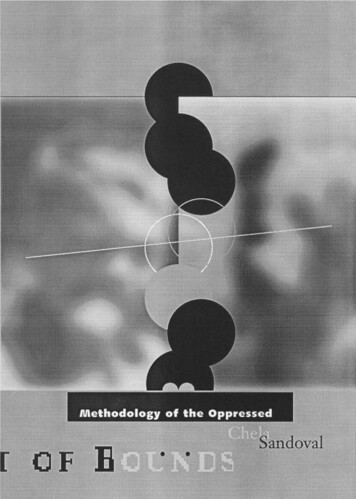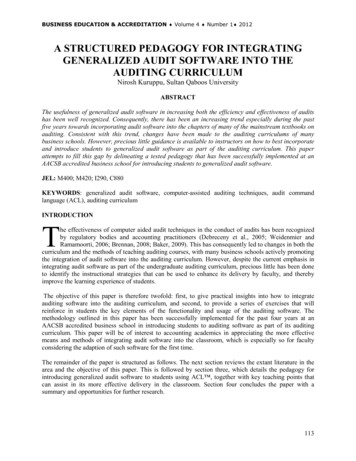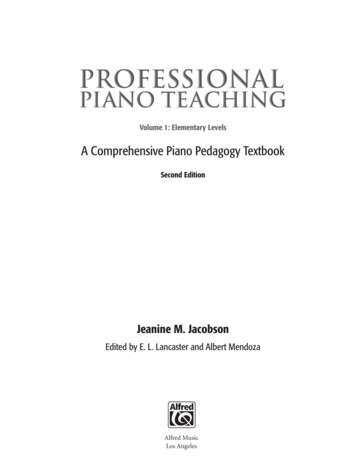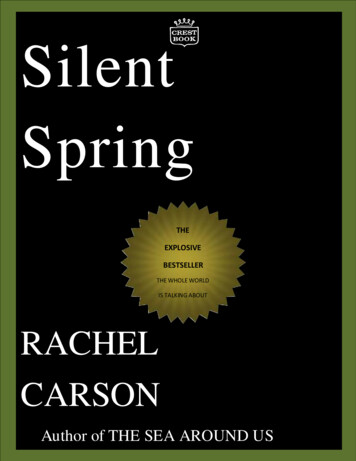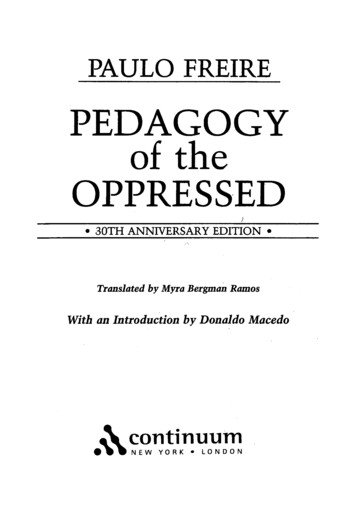
Transcription
PAULO FREIREPEDAGOGYof theOPPRESSED; 30TH ANNIVERSARY EDITION Translated by Myra Bergman RamosWith an Introduction by Donaldo MacedoA continuum I f N E WYORK LONDON
2005The Continuum International Publishing Group Inc15 East 26,h Street, New York, NY 10010The Continuum International Publishing Group LtdThe Tower Building, 11 York Road, London SE1 7NXCopyright 1970, 1993 by Paulo FreireIntroduction 2000 by Donaldo MacedoAll rights reserved. No part of this book may be reproduced,stored in a retrieval system, or transmitted, in any form orby any means, electronic, mechanical, photocopying, recording,or otherwise, without the written permission ofThe Continuum International Publishing Group Inc.Printed in the United States of AmericaLibrary of Congress Cataloging-in-Publication DataFreire, Paulo, 1921[Pedagogia del oprimido. English]Pedagogy of the oppressed / Paulo Freire ; translated by MyraBergman Ramos ; introduction by Donaldo Macedo.—30th anniversary ed.p. cm.Includes bibliographical references.ISBN 0-8264-1276-9 (alk. paper)1. Freire, Paulo, 1921- 2. Education—Philosophy. 3. Populareducation—Philosophy. 4. Critical pedagogy. I. Title.LB880.F73 P4313 2000370.11*5—dc2100-030304
To the oppressed,and to those who suffer with themand fight at their side
ContentsPublisher's Foreword9Introduction to the Anniversary Editionb y DONALDO MACEDO11Foreword by RICHARD SHAULL29Preface35Chapter 1 43The justification for a pedagogy of the oppressed; the contradictionbetween the oppressors and the oppressed, and how it is overcome;oppression and the oppressors; oppression and the oppressed;liberation: not a gift, not a self-achievement, but a mutual process.Chapter 271The "banking" concept of education as an instrument of oppression—its presuppositions—a critique; the problem-posing concept ofeducation as an instrument for liberation—-its presuppositions; the"banking" concept and the teacher-student contradiction; theproblem-posing concept and the supersedence of the teacherstudent contradiction; education: a mutual process, world-mediated;people as uncompleted beings, conscious of their incompletion, andtheir attempt to be more fully human.
8 CONTENTSChapter 387Dialogics—the essence of education as the practice of freedom;dialogics and dialogue; dialogue and the search for programcontent; the human-world relationship, "generative themes," andthe program content of education as the practice of freedom; theinvestigation of "generative themes" and its methodology; theawakening of critical consciousness through the investigation of"generative themes"; the various stages of the investigation.Chapter 4125Antidialogics and dialogics as matrices of opposing theories ofcultural action: the former as an instrument of oppression and thelatter as an instrument of liberation; the theory of antidialogicalaction and its characteristics: conquest, divide and rule,manipulation, and cultural invasion; the theory of dialogicalaction and its characteristics: cooperation, unity, organization, andcultural synthesis.
Publisher's ForewordThis is the thirtieth anniversary of the publication in the United Statesof Pedagogy of the Oppressed. Since the original publication, this revolutionary work has gone into more than a score of printings and soldover 750,000 copies worldwide.In his foreword to the first edition, which is included in this one,Richard Shaull wrote:In this country, we are gradually becoming aware of the work ofPaulo Freire, but thus far we have thought of it primarily in termsof its contribution to the education of illiterate adults in the ThirdWorld. If, however, we take a close look, we may discover thathis methodology as well as his educational philosophy are as important for us as for the dispossessed in Latin America. Forthis reason, I consider the publication of Pedagogy of the Oppressed in an English edition to be something of an event.These words have proved prophetic. Freire's books have since takenon a considerable relevance for educators in our own technologicallyadvanced society, which to our detriment acts to program the individual—especially the disadvantaged—to a rigid conformity. A newunderclass has been created, and it is everyone's responsibility to reactthoughtfully and positively to the situation. This is the underlyingmessage of Pedagogy of the Oppressed.As times change so do attitudes and beliefs. The translation hasbeen modified—and the volume has been newly typeset—to reflectthe connection between liberation and inclusive language. An important introduction by Donaldo Macedo has been added.This revised thirtieth-anniversary edition of Pedagogy of the Oppressed thus represents a fresh expression of a work that will continue tostimulate and shape the thought of educators and citizens everywhere.
IntroductionNever in my wildest dreams would I have imagined when I first readPedagogy of the Oppressed in 1971 that, a decade later, I would beengaged in a very close collaboration with its author, Paulo Freire—a collaboration that lasted sixteen years until his untimely death onMay 2, 1997. Never in my wildest dreams would I have thought that,today, I would have the honor to write an introduction to commemorate the thirtieth anniversary of the publication of Pedagogy of theOppressed, a book that according to Stanley Aronowitz, "meets thesingle criterion of a 'classic' " in that "it has outlived its own time andits authors."I remember vividly my first encounter with Pedagogy of the Oppressed, as a colonized young man from Cape Verde who had beenstruggling with significant questions of cultural identity, yearning tobreak away from the yoke of Portuguese colonialism. Reading Pedagogy of the Oppressed gave me a language to critically understand thetensions, contradictions, fears, doubts, hopes, and "deferred" dreamsthat are part and parcel of living a borrowed and colonized culturalexistence. Reading Pedagogy of the Oppressed also gave me the innerstrength to begin the arduous process of transcending a colonial existence that is almost culturally schizophrenic: being present and yetnot visible, being visible and yet not present. It is a condition that Ipainfully experienced in the United States, constantly juggling thepower asymmetry of the two worlds, two cultures, and two languages.Reading Pedagogy of the Oppressed gave me the critical tools to reflect on, and understand, the process through which we come to knowwhat it means to be at the periphery of the intimate yet fragile relationship between the colonizer and the colonized.
12 INTRODUCTIONPaulo Freire's invigorating critique of the dominant banking modelof education leads to his democratic proposals of problem-posing education where "men and women develop their power to perceive critically the way they exist in the world with which and in which theyfind themselves; they come to see the world not as a static reality butas a reality in the process of transformation." This offered to me—and all of those who experience subordination through an imposedassimilation policy—a path through which we come to understandwhat it means to come to cultural voice. It is a process that alwaysinvolves pain and hope; a process through which, as forced culturaljugglers, we can come to subjectivity, transcending our object positionin a society that hosts us yet is alien.It is not surprising that my friends back in Cape Verde—and, forthat matter in most totalitarian states—risked cruel punishment, including imprisonment, if they were caught reading Pedagogy of theOppressed. I remember meeting a South African student in Bostonwho told me that students would photocopy chapters of Pedagogy ofthe Oppressed and share them with their classmates and peers. Sometimes, given the long list of students waiting to read Freire, theywould have to wait for weeks before they were able to get their handson a photocopied chapter. These students, and students like them inCentral America, South America, Tanzania, Chile, Guinea-Bissau andother nations struggling to overthrow totalitarianism and oppression,passionately embraced Freire and his proposals for liberation. It is nowonder that his success in teaching Brazilian peasants how to readlanded him in prison and led to a subsequent long and painful exile.Oppressed people all over the world identified with Paulo Freire'sdenunciation of the oppressive conditions that were choking millionsof poor people, including a large number of middle-class families thathad bitterly begun to experience the inhumanity of hunger in a potentially very rich and fertile country.Freire's denunciation of oppression was not merely the intellectualexercise that we often find among many facile liberals and pseudocritical educators. His intellectual brilliance and courage in denouncing the structures of oppression were rooted in a very real andmaterial experience, as he recounts in Letters to Cristina:
INTRODUCTION 13It was a real and concrete hunger that had no specific date ofdeparture. Even though it never reached the rigor of the hungerexperienced by some people I know, it was not the hunger experienced by those who undergo a tonsil operation or are dieting.On the contrary, our hunger was of the type that arrives unannounced and unauthorized, making itself at home without an endin sight. A hunger that, if it was not softened as ours was, wouldtake over our bodies, molding them into angular shapes. Legs,arms, and fingers become skinny. Eye sockets become deeper,making the eyes almost disappear. Many of our classmates experienced this hunger and today it continues to afflict millions ofBrazilians who die of its violence every year.1Thus, Pedagogy of the Oppressed has its roots in Paulo Freire's livedexperiences.The experience of hunger as a child of a middle-class family thathad lost its economic base enabled Freire to, on the one hand, identifyand develop "solidarity with the children from the poor outskirts oftown"2 and, on the other hand, to realize that "in spite of the hungerthat gave us solidarity. in spite of the bond that united us in oursearch for ways to survive—our playtime, as far as the poor childrenwere concerned, ranked us as people from another world who happened to fall accidentally into their world."3 It is the realization ofsuch class borders that led, invariably, to Freire's radical rejection ofa class-based society.Although some strands of postmodernism would dismiss Freire'sdetailed class analysis in Pedagogy of the Oppressed, it is an enormousmistake, if not academic dishonesty, to pretend that we now live in aclassless world. Although Freire understood very well that "materialoppression and the affective investments that tie oppressed groups tothe logic of domination cannot be grasped in all of their complexitywithin a singular logic of class struggle/'4 he consistently argued thata thorough understanding of oppression must always take a detourthrough some form of class analysis.Until his death, he courageously denounced the neoliberal positionthat promotes the false notion of the end of history and the end ofclass. Freire always viewed history as possibility, "recognizing thatHistory is time filled with possibility and not inexorably determined—
14 INTRODUCTIONthat the future is problematic and not already decided, fatalistically,"5In like manner, Freire continued to reject any false claim to the endof class struggle. Whereas he continually revised his earlier class analyses, he never abandoned or devalued class as an important theoretical category in our search for a better comprehension of conditionsof oppression. In a long dialogue we had during his last visit to NewYork—in fact, the last time we worked together—he again said thatalthough one cannot reduce everything to class, class remains an important factor in our understanding of multiple forms of oppression.While poststructuralists may want to proclaim the end of class analysis, they still have to account for the horrendous human conditionsthat led, as Freire recounted, a family in Northeast Brazil to scavengea landfill and take "pieces of an amputated human breast with whichthey prepared their Sunday lunch/' 6Freire also never accepted the ' poststructuralism tendency to translate diverse forms of class, race, and gender based oppression to thediscursive space of subject positions/'7 He always appreciated the theoretical complexity of multifactor analyses while never underestimating the role of class. For example, he resisted the essentialist approachof reducing all analysis to one monolithic entity of race. For instance,African functionaries who assimilate to colonial cultural values constitute a distinct class with very different ideological cultural valuesand aspirations than the bulk of the population. Likewise, it would bea mistake to view all African Americans as one monolithic culturalgroup without marked differences: United States Supreme Court Justice Clarence Thomas is black, after all (and conservative). Somewhatsimilar gulfs exist between the vast mass of African Americans whoremain subordinated and reduced to ghettoes and middle-class African Americans who, in some sense, have also partly abandoned thesubordinated mass of African Americans. I am reminded of a discussion I had with a personal friend of Dr. Martin Luther King, Jr., whohad joined him in the important struggle to end segregation and oppression during the 1960s. During our discussion, King's friend remarked, "Donaldo, you are right. We are using euphemisms such asEconomically marginal' and avoid more pointed terms like 'oppres-
I N T R O D U C T I O N 15sion/ I confess that I often feel uneasy when I am invited to discussat institutions issues pertaining to the community. In reality, I haven'tbeen there in over twenty years." Having achieved great personalsuccess and having moved to a middle-class reality, this African American gentleman began to experience a distance from other AfricanAmericans who remain abandoned in ghettoes.In a recent discussion with a group of students, a young AfricanAmerican man who attends an Ivy League university told me that hisparents usually vote with the white middle class, even if, in the longrun, their vote is detrimental to the reality of most black people. Thus,we see again that race, itself, is not necessarily a unifying force.Freire never abandoned his position with respect to class analysisas theorized in Pedagogy of the Oppressed. However, as he continuallydid, he reconstituted his earlier position throughout the years, particularly in our co-authored book Ideology Matters. In it Freire arguesthat whereas, for example, "one cannot reduce the analysis of racismto social class, one cannot understand racism fully without a classanalysis, for to do one at the expense of the other is to fall prey intoa sectarianist position, which is as despicable as the racism that weneed to reject."8 In essence, Freire's later works make it clear thatwhat is important is to approach the analysis of oppression through aconvergent theoretical framework where the object of oppression iscut across by such factors as race, class, gender, culture, language,and ethnicity. Thus, he would reject any theoretical analysis thatwould collapse the multiplicity of factors into a monolithic entity, including class.Although Freire was readily embraced in societies strugglingagainst colonialism and other forms of totalitarianism, his acceptancein the so-called open and democratic societies, such as the UnitedStates and the nations of Western Europe, has been more problematic. Even though he has an international reputation and following, his work is, sadly, not central to the curricula of most schools ofeducation whose major responsibility is to prepare the next generation of teachers. This relative marginality of Freire's work in theschool-of-education curricula is partly due to the fact that most of
16 I N T R O D U C T I O Nthese schools are informed by the positivistic and management modelsthat characterize the very culture of ideologies and practices to whichFreire was in opposition all his life. For example, the Harvard Graduate School of Education sanctions a graduate course called "LiteracyPolitics and Policies" without requiring students to read, critique, andanalyze the work of Freire. In fact, one can get a doctoral degreefrom this school, or from others, without ever learning about, muchless reading, Paulo Freire. This is tantamount to getting a doctoraldegree in Linguistics without ever reading Noam Chomsky, The following illustrates my point. In a lecture at Harvard that analyzedPaulo Freire's theories, given by Professor Ramon Flecha from theUniversity of Barcelona, a doctoral student approached me and askedthe following: "I don't want to sound naive, but who is this PauloFreire that Professor Flecha is citing so much?" I wonder, how canone expect this doctoral student to know the work of "perhaps themost significant educator in the world during the last half of the century" in the words of Herbert Kohl,9 when his graduate school pretends that Paulo Freire never existed?Whereas students in the Third World and other nations strugglingwith totalitarian regimes would risk their freedom, if not their lives,to read Paulo Freire, in our so-called open societies his work suffersfrom a more sophisticated form of censorship: omission. This "academic selective selection" of bodies of knowledge, which borders oncensorship of critical educators, is partly to blame for the lack ofknowledge of Paulo Freire's significant contributions to the field ofeducation. Even many liberals who have embraced his ideas and educational practices often reduce his theoretical work and leading philosophical ideas to a mechanical methodology. I am reminded of apanel that was convened to celebrate Freire's life and work at Harvardafter his death. In a large conference room filled to capacity and withpeople standing in hallways, a panelist who had obviously reducedFreire's leading ideas to a mechanized dialogical practice passed anote to the moderator of the panel suggesting that she give everyonein the room twenty seconds to say something in keeping with thespirit of Freire. This was the way not to engage Freire's belief in
INTRODUCTION 17emancipation—unless one believes that his complex theory of oppression can be reduced to a twenty-second sound bite. Part of theproblem with this mechanization of Freire's leading philosophical andpolitical ideas is that many psudocritical educators, in the name ofliberation pedagogy, often sloganize Freire by straitjacketing his revolutionary politics to an empty cliche of the dialogical method.Pseudo-Freirean educators not only strip him of the essence of hisradical pedagogical proposals that go beyond the classroom boundaries and effect significant changes in the society as well: these educators also fail to understand the epistemological relationship ofdialogue. According to Freire,In order to understand the meaning of dialogical practice, wehave to put aside the simplistic understanding of dialogue as amere technique. Dialogue does not represent a somewhat falsepath that I attempt to elaborate on and realize in the sense ofinvolving the ingenuity of the other. On the contrary, dialoguecharacterizes an epistemological relationship. Thus, in this sense,dialogue is a way of knowing and should never be viewed as amere tactic to involve students in a particular task. We have tomake this point very clear. I engage in dialogue not necessarilybecause I like the other person. I engage in dialogue because Irecognize the social and not merely the individualistic characterof the process of knowing. In this sense, dialogue presents itselfas an indispensable component of the process of both learningand knowing.10Unfortunately, in the United States, many educators who claim tobe Freirean in their pedagogical orientation mistakenly transform Freire's notion of dialogue into a method, thus losing sight of the factthat the fundamental goal of dialogical teaching is to create a processof learning and knowing that invariably involves theorizing about theexperiences shared in the dialogue process. Some strands of criticalpedagogy engage in an overdose of experiential celebration that offersa reductionistic view of identity leading Henry Giroux to point outthat such pedagogy leaves identity and experience removed from theproblematics of power, agency, and history. By overindulging in the
18 INTRODUCTIONlegacy and importance of their respective voices and experiences,these educators often fail to move beyond a notion of difference structured in polarizing binarisms and uncritical appeals to the discourseof experience. I believe that it is for this reason that some of theseeducators invoke a romantic pedagogical mode that "exoticizes" discussing lived experiences as a process of coming to voice. At the sametime, educators who misinterpret Freire's notion of dialogical teachingalso refuse to link experiences to the politics of culture and criticaldemocracy, thus reducing their pedagogy to a form of middle-classnarcissism. This creates, on the one hand, the transformation of dialogical teaching into a method invoking conversation that providesparticipants with a group-therapy space for stating their grievances.On the other hand, it offers the teacher as facilitator a safe pedagogical zone to deal with his or her class guilt. It is a process that bellhooks characterizes as nauseating in that it brooks no dissent. Simplyput, as Freire reminded us, "what these educators are calling dialogical is a process that hides the true nature of dialogue as a process oflearning and knowing. . . .Understanding dialogue as a process oflearning and knowing establishes a previous requirement that alwaysinvolves an epistemological curiosity about the very elements of thedialogue."11 That is to say, dialogue must require an ever-present curiosity about the object of knowledge. Thus, dialogue is never an endin itself but a means to develop a better comprehension about theobject of knowledge. Otherwise, one could end up with dialogue asconversation where individual lived experiences are given primacy. Ihave been in many contexts where the over-celebration of one's ownlocation and history often eclipses the possibility of engaging the object of knowledge by refusing to struggle directly, for instance, withreadings involving an object of knowledge, particularly if these readings involve theory.As Freire himself decidedly argued,Curiosity about the object of knowledge and the willingness andopenness to engage theoretical readings and discussions is fundamental. However, I am not suggesting an over-celebration of
I N T R O D U C T I O N 19theory. We must not negate practice for the sake of theory. Todo so would reduce theory to a pure verbalism or intellectualism. By the same token, to negate theory for the sake of practice, as in the use of dialogue as conversation, is to run the riskof losing oneself in the disconnectedness of practice. It is forthis reason that I never advocate either a theoretic elitism or apractice ungrounded in theory, but the unity between theoryand practice. In order to achieve this unity, one must have anepistemological curiosity—a curiosity that is often missing in dialogue as conversation.12That is, when students lack both the necessary epistemological curiosity and a certain conviviality with the object of knowledge understudy, it is difficult to create conditions that increase their epistemological curiosity in order to develop the necessary intellectual toolsthat will enable him or her to apprehend and comprehend the objectof knowledge. If students are not able to transform their lived experiences into knowledge and to use the already acquired knowledge asa process to unveil new knowledge, they will never be able to participate rigorously in a dialogue as a process of learning and knowing.In truth, how can one dialogue without any prior apprenticeship withthe object of knowledge and without any epistemological curiosity?For example, how can anyone dialogue about linguistics if the teacherrefuses to create the pedagogical conditions that will apprentice students into the new body of knowledge? By this I do not mean thatthe apprenticeship process should be reduced to the authoritariantradition of lecturing without student input and discussion. What becomes very clear is that the bureaucratization of the dialogical processrepresents yet another mechanism used by even some progressiveeducators to diminish Freire's radical revolutionary and transformativeproposals through a process that gives rise to politics without content.Thus, it is not surprising that some liberals join conservative educatorsto critique Freire for what they characterize as "radical ties." Forexample, Gregory Jay and Gerald Graff have argued that Freire's proposal in Pedagogy of the Oppressed to move students toward "a critical perception of the world"—which "implies a correct method ofapproaching reality" so that they can get "a comprehension of total
20 INTRODUCTIONreality"—assumes that Freire already knows the identity of the oppressed. As Jay and Graff point out, "Freire assumes that we knowfrom the outset the identity of the Oppressed' ahd their 'oppressors/Who the oppressors and the oppressed are is conceived not as anopen question that teachers and students might disagree about, butas a given of Freirean pedagogy."13 This form of critique presupposesthat education should be nondirective and neutral, a posture thatFreire always opposed: "I must intervene in teaching the peasantsthat their hunger is socially constructed and work with them to helpidentify those responsible for this social construction, which is, in myview, a crime against humanity."14 Therefore, we need to intervenenot only pedagogically but also ethically. Before any intervention,however, an educator must have political clarity—posture that makesmany liberals like Graff very uncomfortable to the degree that heconsiders "Radical educational theorists such as Freire, Henry Giroux,and Stanley Aronowitz . . . [as having a] tunnel-vision style of. . . writing . . . which speaks of but never to those who oppose its premises."15The assumption that Freire, Giroux, and Aronowitz engage in a"tunnel-vision style of. . . writing" is not only false: it also points to adistorted notion that there is an a priori agreed-upon style of writingthat is monolithic, available to all, and "free of jargon." This blindand facile call for writing clarity represents a pernicious mechanismused by academic liberals who suffocate discourses different fromtheir own. Such a call often ignores how language is being used tomake social inequality invisible. It also assumes that the only way todeconstruct ideologies of oppression is through a discourse that involves what these academics characterize as a language of clarity.When I was working with Freire on the book Literacy: Readingthe Word and the World, I asked a colleague whom I considered tobe politically aggressive and to have a keen understanding of Freire'swork to read the manuscript. Yet, during a discussion we had aboutthis, she asked me, a bit irritably, "Why do you and Paulo insist onusing Marxist jargon? Many readers who may enjoy reading Paulo maybe put off by the jargon." I was at first taken aback, but proceededto explain calmly to her that the equation of Marxism with jargon did
INTRODUCTION ' 2 1not fully capture the richness of Freire's analysis. In fact, I remindedher that Freire's language was the only means through which he couldhave done justice to the complexity of the various concepts dealingwith oppression. For one thing, I reminded her, "Imagine that insteadof writing Pedagogy of the Oppressed Freire had written "Pedagogyof the Disenfranchised.77 The first title utilizes a discourse that namesthe oppressor, whereas the second fails to do so. If you have an "oppressed," you must have an "oppressor/' What would be the counterpart of disenfranchised? "Pedagogy of the Disenfranchised77dislodges the agent of the action while leaving in doubt who bearsthe responsibility for such action. This leaves the ground wide openfor blaming the victim of disenfranchisement for his or her own disenfranchisement. This example is a clear case in which the object ofoppression can also be understood as the subject of oppression. Language like this distorts reality.And yet, mainstream academics like Graff seldom object to theselinguistic distortions that disfigure reality. I seldom hear academicson a crusade for "language clarity" equate mainstream terms such as"disenfranchised" or "ethnic cleansing," for example, to jargon status.On the one hand, they readily accept "ethnic cleansing," a euphemismfor genocide, while, on the other hand, they will, with certain automatism, point to the jargon quality of terms such as "oppression/' "subordination," and "praxis." If we were to deconstruct the term "ethniccleansing" we would see that it prevents us from becoming horrifiedby Serbian brutality and horrendous crimes against Bosnian Muslims.The mass killing of women, children, and the elderly and the rape ofwomen and girls as young as five years old take on the positive attribute of "cleansing," which leads us to conjure a reality of "purification" of the ethnic "filth" ascribed to Bosnian Muslims, inparticular, and to Muslims the world over, in general.I also seldom heard any real protest from the same academics whowant "language clarity" when, during the Gulf War, the horrific bloodbath of the battlefield became a "theater of operation," and the violentkilling of over one hundred thousand Iraqis, including innocentwomen, children, and the elderly by our "smart bombs," was sanitized
22 INTRODUCTIONinto a technical term: "collateral damage." I can go on with example
Oppressed, a book that according to Stanley Aronowitz, "meets the single criterion of a 'classic' " in that "it has outlived its own time and its authors." I remember vividly my first encounter with Pedagogy of the Op pressed, as a colonized young man from Cape Verde who had been strug
